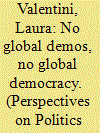|
|
|
Sort Order |
|
|
|
Items / Page
|
|
|
|
|
|
|
| Srl | Item |
| 1 |
ID:
136697


|
|
|
|
|
| Summary/Abstract |
The disparities in per-capita wealth and national productivity that divide the United States and Latin America today have often been understood as results of institutional variations introduced during each region's period of imperial rule. According to this interpretation, path-dependent processes preserved institutions installed by Britain, Spain, and Portugal across the centuries, propagating their positive or negative economic effects, and eventually producing a marked “development gap” in the hemisphere. This article aims to improve this account by highlighting the direct and indirect economic effects of the success or failure of the political unions established after independence in both the United States and Latin America. It demonstrates that influential political theorists throughout the hemisphere understood the developmental advantages to be gained from unifying former colonies and employing the political authority newly at their disposal to abolish the stifling institutional legacies of European rule, suggesting that if Spanish America's unions had endured, or conversely, if the United States had collapsed, the two regions' economies might not have diverged as dramatically as they subsequently did. This illustrates an important contribution that the emerging subfield of “comparative political theory” can make to comparative political science in general, and to the new institutionalism in particular, by providing uniquely direct insight into the choices available to political actors in consequential moments of institutional genesis and change, and revealing the contingency of institutional variations that might otherwise appear inevitable.
|
|
|
|
|
|
|
|
|
|
|
|
|
|
|
|
| 2 |
ID:
136696


|
|
|
|
|
| Summary/Abstract |
A globalized world, some argue, needs a global democracy. But there is considerable disagreement about whether global democracy is an ideal worth pursuing. One of the main grounds for scepticism is captured by the slogan: “No global demos, no global democracy.” The fact that a key precondition of democracy—a demos—is absent at the global level, some argue, speaks against the pursuit of global democracy. I discuss four interpretations of the skeptical slogan—each based on a specific account of the notion of “the demos”—and conclude that none of them establishes that the global democratic ideal must be abandoned. In so doing, I systematize different types of objections against global democracy, thus bringing some clarity to an otherwise intricate debate, and offer a robust but qualified defense of the global democratic
|
|
|
|
|
|
|
|
|
|
|
|
|
|
|
|
| 3 |
ID:
136695


|
|
|
|
|
| Summary/Abstract |
Environmental devastation is not only a byproduct of war, but has also been a military strategy since ancient times. How have the norms and laws of war addressed the damage that war inflicts on the environment? How should “environmental war crimes” be defined and addressed? I address these questions by critically examining the way that distinctions between legitimate and illegitimate wartime environmental destruction have been drawn in debates on just war theory and the laws of war. I identify four distinctive formulations for framing the wartime significance of nature that appear in such debates and analyze how each is associated with distinctive claims regarding what constitutes “humaneness” in times of war: nature as property; nature as combatant; nature as Pandora's Box; and nature as victim. I argue that efforts to investigate and judge the environmental impact of war destabilize and expose the limitations of core distinctions that animate humanitarian norms, but also offer an important and neglected source of guidance in addressing those limitations.
|
|
|
|
|
|
|
|
|
|
|
|
|
|
|
|
| 4 |
ID:
136698


|
|
|
|
|
| Summary/Abstract |
Welfare programs distribute benefits to citizens. Perhaps even more importantly, by conveying powerful messages about how the state views poor people, welfare programs shape people’s views about themselves as subjects or citizens. Theoretical debates on how public policies can enhance democratic citizenship inspire our study of Brazil’s Bolsa Família (Family Grant). Has this conditional cash transfer program, which forms a major point of contact between the state and millions of poor Brazilians, elevated feelings of social inclusion and agency? A prominent perspective in the welfare-state literature would not expect a positive outcome given the strict means testing and behavioral requirements entailed. Yet our focus group research with Bolsa Família recipients suggests that the program does foster a sense of belonging and efficacy. Policy design and government discourse matter. This innovative welfare program yields rich insights on alternative paths to citizenship development for middle- and low-income countries in the third wave of democracy
|
|
|
|
|
|
|
|
|
|
|
|
|
|
|
|
|
|
|
|
|